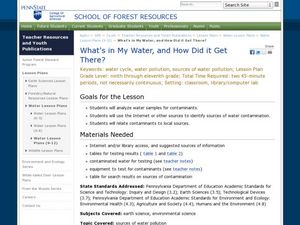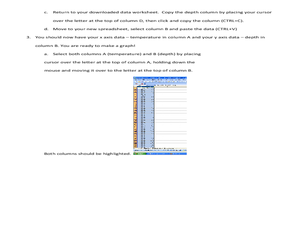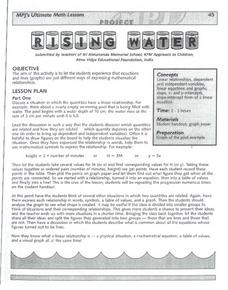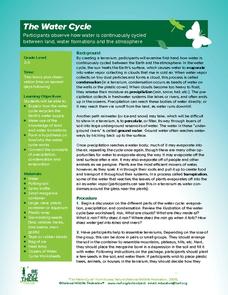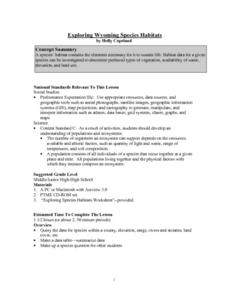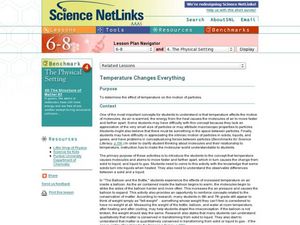Curated OER
Land and People: Cape Cod Activity 1
Students make a model aquifer to study the uniqueness of Cape Cod's ground-water system. Using the model., they determine how easily contamination spreads in the aquifer system by completing and recording three activities. Using the...
Teach Engineering
Are We Alone?
Find an answer to the age-old debate of whether life exists on Mars. Groups determine criteria to help look for signs of life on Mars. The activity has the class simulate testing Martian soil samples for signs of life before drawing...
Curated OER
Water: Naturally Cleaned
Students use stream trays covered in different types of rocks or soil to investigate infiltrates and runoff. In this water pollution lesson plan, students work in groups with stream trays that have different substrates. They write a...
Curated OER
What's in My Water, and How Did it Get There?
Students analyze water samples to see the contaminants and then use the Internet to find the sources of the contamination. In this investigative water lesson students analyze water and work together to solve the mystery of...
Curated OER
FOLLOW THAT WATER
Learners build simple stream tables and vary the angle of the stream tables in order to simulate different flow rates and compare the results. They observe various features formed in a stream table by flowing water and compare these to...
Curated OER
Who Dirtied The Water/Clean Water: Is It Drinkable?
Students enter the room, receive a film canister that contains materials that be added to the dirty water bell jar. They record on their data table who or what is doing the adding and the actual substance that has been added to the bell...
Curated OER
What's A Water Column Profile?
Students investigate water column data. In this earth science and seawater lesson, students determine how temperature, salinity, and density have an impact on sea water by viewing and analyzing data obtained from a number of websites....
Curated OER
Rising Water!
Students observe water change from a liquid to a gas state when heated and then return to its liquid stage when cooled. They learn that gas molecules move faster than liquid molecules. They discover physical properties that describe how...
Curated OER
Breaking News English: Moon Water
In this water on the moon worksheet, students read the article, answer true and false questions, complete synonym matching, complete phrase matching, complete a gap fill, answer short answer questions, answer discussion questions, write,...
Curated OER
The Water Cycle
Students list the nine places on earth where water is found. They define the terms cycle and water cycle. Students explain how energy from the sun powers the movement of water molecules through the water cycle. They name and describe...
Curated OER
Water Conservation/ Pollution: Why is the Water Running?
Students consider water conservation and chemical pollution of water. In this water use instructional activity, students discover how water towers and dams are used to take water to desired locations. Students also discuss the effects of...
Port Jefferson School District
Climate Patterns
Young climatologists explore the factors that contribute to a region's climate in this two-part earth science activity. To begin, learners are provided with a map of an imaginary planet and are asked to label global wind and...
Curated OER
Unit 2: Global to Local: Understanding My Place in the Hydrosphere
What does the ground around your home have to do with water pollution? Young ecologists learn about their local watershed and create their own cause-and-effect models of the hydrosphere.
Sunburst Visual Media
Clouds
Support science instruction with a combination of engaging activities and skills-based worksheets that focus on clouds. Learners take part in grand discussions, write an acrostic poem, complete graphic organizers, solve word...
Curated OER
Water Table
Students predict from a rock sample whether a water well could be drilled in that type of rock. They predict what conditons would be necessary for the well to produce water.
Curated OER
Why Oil and Water Don't Mix
Second graders explore why oil and water do not mix. They make and record their predictions and observe the experiment in which cooking oil is mixed with a glass of water. Students discuss why they think the oil and water did not mix and...
Curated OER
The Water Cycle Game
Students study the path and forms of water through Earth. In this water cycle lesson, students role-play water as it moves throughout the Earth. Students play the water cycle game and complete various stations to learn about water forms...
Curated OER
Water Quality in the Greenhills Stream
Seventh graders conduct year long study of water quality over different seasons using variety of probes, including D.O., pH, conductivity and temperature, that are attached to portable technology. Students select three data points in...
Curated OER
The Water Cycle
Students are introduced to the components and importance of the water cycle. They are shown how groundwater moves using a model. Students list 9 places on earth where water is found. They define the terms cycle and water cycle.
Curated OER
Water and Ice
Students conduct an experiment. In this forms of water instructional activity, students observe ice to see what changes take place and then write in their journal about what they observed.
Curated OER
Fighting Corrosion to Save an Ancient Greek Bronze
Study corrosion on bronze statues with a hands-on lesson. As pupils place a penny in water with salt, they observe the changes in the penny throughout a period of a week. They then analyze the pre-conservation and the...
Curated OER
Exploring Wyoming Species Habitats
Students are introduced to the concept of species habitats and ranges. They introduced to ArcView GIS as a tool for mapping. Pupils use query data for species withina county, elevation, range, rivers and streams, land cover, and etc....
Curated OER
Water Creates a Cave
Pupils study the role of water in limestone cave formation and create a cave on karst-like grid on paper.
Curated OER
Temperature Changes Everything
Middle school chemists visit interactive websites in order to discover what happens to molecular motion when heat is added to matter. They conduct an experiment that demonstrates the expansion of matter with the addition of heat. A lab...



